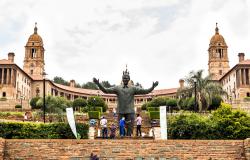From pariah to protector? South Africa, genocide, and the world court

South Africa’s case against Israel at the International Court of Justice belies its recent history of ignoring international law, writes Imogen Saunders. But the case could have long term consequences for how international justice operates.
On 29 December 2023, South Africa instituted proceedings against Israel in the International Court of Justice in The Hague. Pretoria accused Israel of failing to prevent genocide in the Gaza strip and of committing genocide there.
South Africa’s recent history with international law has been checkered. In 2015, South African authorities refused to arrest Sudanese President Omar al-Bashir despite an outstanding warrant for his arrest which lead to a ruling against South Africa by the ICC. In 2023, there was doubt about whether South Africa would arrest Russian President Putin (also subject to an ICC arrest warrant) on his planned visit to the BRICS summit in Johannesburg. Ultimately Putin chose not to visit in person, freeing Pretoria from choosing between following international law and protecting their ally.
South Africa has now turned to a different court – the International Court of Justice (ICJ) – to enforce international law. There are of course political aspects to this decision: Israel had a close relationship with the apartheid South African government in the 1970s and 1980s, and there are clear parallels between the colonialism imposed on Africa and the situation in Gaza.
Legal issues
The use of the ICJ by an African state is unusual. African nations have been involved (as applicant or respondent) in 37 contentious cases before the so-called ‘World Court’ since its inception in 1945. Over two-thirds of these cases have had African nations as both applicant and respondent. Most of these are regional disputes over territory, border incursions and delimitation. South Africa’s decision to enforce an international treaty designed for preventing atrocities is thus outside the normal use of the Court by African states.
Historically the use of human rights law, international criminal law and/or atrocity-prevention instruments has predominantly been by non-African states against African States: not the other way round. This usually occurs in one of two ways. In one, the non-African state will bring domestic criminal proceedings against an African official accused of international crimes; this may result in the African ‘target’ state bringing an ICJ challenge to this non-African state’s exercise of jurisdiction (such as the Democratic Republic of the Congo’s challenge to Belgium’s prosecution of the then Congolese Foreign Affairs Minister; or the Republic of the Congo’s challenge of France’s prosecution of certain Congolese officials). In the other scenario, the non-African state will use the ICJ to directly enforce an international convention against the African State – such as Belgium’s invocation of the Convention Against Torture against Senegal in 2009 accusing Senegal of failing to prosecute Hissène Habré for acts of torture.
Normally in international law, a state enforcing a right owed to it must show it is affected by breach of that right: usually by direct injury to it or one of its nationals. But there is a doctrine of Erga omnes partes – meaning ‘owed to all parties’ – which allows a state that has not suffered direct injury from a breach of a treaty obligation to nonetheless enforce that obligation against the breaching state.
It is the quality and nature of the obligation – one that all humanity has an interest in upholding – that gives rise to the right of an otherwise ‘unaffected’ state to enforce it. This is particularly important for breaches of grave human rights and/or atrocity crimes. This is because the victims of the alleged abuses and crimes are often either the nationals of the state perpetrating the crime or may not be nationals of a state recognised in international law at all, as is the case in Gaza.
Implications
South Africa’s case is significant, because it builds on international acceptance of this common interest as a route to international accountability. To be clear, the ICJ has not concluded anything on the merits of the case against Israel. However it has, by a majority in the provisional measures stage of the South Africa case, accepted the right of South Africa to bring the case.
There is a certain irony that South Africa has contributed in this way to the development of the erga omnes partes doctrine. Prior to the current proceedings, the only ICJ cases involving South Africa were the two South-West Africa cases, brought against the apartheid South African government in 1960 by Ethiopia and Liberia. Ethiopia and Liberia claimed that the discriminatory apartheid policies of the Pretoria regime clearly violated the terms of the mandate that the League of Nations (the predecessor to the United Nations) had set up over (then) South-West Africa (present-day Namibia). That case was dismissed for lack of a legal interest, or standing, on behalf of Ethiopia and Liberia, as they were seeking to enforce the rights of foreign nationals rather than their own citizens. The court held that ‘an actio popularis, or right resident in any member of a community to take legal action in vindication of a public interest . . . is not known to international law as it stands at present.’ Fast forward 60-odd years and the rights of states to take legal actions through the doctrine known as erga omnes partes is solidifying as an accepted part of international law, in part because of the actions of South Africa.
The past interactions South Africa has had with international law cannot be underestimated. The grave human rights abuses of the apartheid era were well known at the time – and further confirmed in the ICJ hearings in the South-West Africa cases. Nonetheless, other states chose to use rhetoric to condemn the regime rather than take real action to repress or stop it. When the World Court was called on, as outlined above, it found itself with its hands tied by a procedural bar.
The international adjudicatory system could not prevent or stop South Africa’s occupation of South-West Africa, or apartheid in South Africa. In this context the pleadings from South Africa in the provisional measures phase of the case against Israel in February 2024 take on a special significance:
‘We are also particularly mindful of Israel’s institutionalized régime of discriminatory laws, policies, and practices designed and maintained to establish domination, subjecting the Palestinian people to apartheid…’ – His Excellency Mr Vusimuzi Madonsela, is South Africa’s ambassador to the Netherlands.
‘The people of South Africa and of Israel both have a history of suffering. Both States have become parties to the Genocide Convention in the determination to end suffering… It is in terms of this Convention, dedicated to saving humanity, that South Africa brings this dispute before the Court.’ – John Dugard, Professor of International Law at the University of Pretoria.
South Africa, in its pleadings, invoked its own history to give itself a right and justification (morally, if not legally) that extends beyond the common interest required for erga omnes partes standing. Its case against Israel is grounded in the historical injustice that South Africa itself suffered, and it is striking that this is the first use of the World Court by post-apartheid South Africa. However, the transformation from pariah to protector cannot be considered complete while South Africa picks and chooses which international laws (and international institutions) it will support.
In 2023 after much prevaricating, Pretoria took steps so that it could arrest Putin if he did travel to South Africa: but it resolve this was never tested. It will be interesting to see how South Africa approaches its new found interest in international law if the Russian president does ever visit South Africa.
Associate Professor Imogen Saunders is the Director of the Centre for International and Public Law at the Australian National University College of Law. She researches in international law, including on the history of women in international law, backlashes against international law and institutions, and international law and territory.
This first appeared on Africa@LSE.
Photo by Clayton


